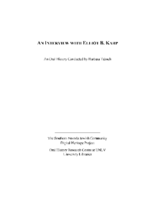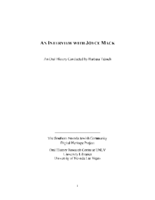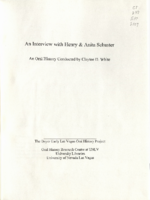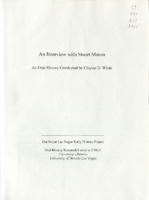Search the Special Collections and Archives Portal
Search Results

Transcript of interview with Elliot B. Karp by Barbara Tabach, December 17, 2014
Date
Archival Collection
Description
Interview with Elliot B. Karp by Barbara Tabach on December 17, 2014. In this interview, Elliot Karp discusses growing up in a culturally Jewish household in New York and becoming more observant in his teenage and college years. He decided, after a trip to Israel and a year in a rabbinical program, that he wanted to be a "Jewish professional" with a focus on social work and community organizing, and attended a Master's program at Brandeis University. Karp goes on to talk about his work for the Jewish Federation in Ohio and Pennsylvania, and being recruited to come to Las Vegas. He talks about the challenges in the Las Vegas Jewish community and the Jewish Federation's role as an umbrella organization to partner with other agencies to grow and sustain a robust Jewish community in Southern Nevada.
On October 6, 1955, Elliot Karp was born in Mineola, New York to parents of East European heritage who identified as culturally Jewish. As a teenager, Elliot felt the calling to become kosher, balancing this practice with household norms that were not as strict. He eventually became shomer Shabbat just after enrolling at State University of New York at Stony Brook, where he majored in Political Science. After graduating from SUNY, Elliot spent a year living in Israel considering a path in rabbinical studies. By the end of his time, he decided on a different, yet related path, and registered as a graduate student in Brandeis University's School of Jewish Communal Service, on fellowship from Council of Jewish Federations. After graduating, Elliot moved to Columbus, Ohio to work for the Jewish Federation, focusing on fundraising, but was exposed to many different operational areas of the organization. After three years, Elliot was recruited to the Philadelphia office as its director of leadership development. He then left the Federation to work in development at Brandeis University, but after two years, returned to the Federation as the Cincinnati office's chief development officer. In 2008, Elliot received a call to take his highly cultivated leadership and fundraising skills to another Federation office: Las Vegas. After much consideration, he took the job - and challenge - as the office's new chief executive officer. Since then, Elliot has done much to promote communication, coordination and collaboration within the local Jewish community and beyond, through relationship building and successful fundraising efforts. His ultimate desire is to expand funding for programs that get more people involved in Jewish life - while also empowering community members define what a Jewish life means for them.
Text

Transcript of interview with Miriam "Mimi" Katz by Barbara Tabach, December 10, 2014
Date
Archival Collection
Description
In this interview, Mimi Katz discusses growing up in the Boston area and her schooling, and moving to Washington, D.C. working as a physiotherapist. She returned to Boston and met her husband, and she talks about moving to Las Vegas and adjusting to life here. They became involved at Temple Beth Sholom, and Mimi worked as a conventions coordinator at the Sands and the Sahara. She discusses moving around in Las Vegas from an apartment to a house in the John S. Park neighborhood, working for the Jewish Federation, and helping to develop the Holocaust education program with Edythe Katz, conducting oral history interviews with survivors. She continued working at the Convention Center in the 1980s, and is involved in the Lou Ruvo Center.
Everyone knows her as Mimi. She was born Miriam Green to immigrant parents in Boston, Massachusetts, in 1926. As a youngster she danced, excelled at school and enjoyed an abundance of sports. To pay for her higher education at Massachusetts School of Physiotherapy she worked at Raytheon Manufacturing. In 1957 she married George Katz who swept her away to their honeymoon in Las Vegas. It's a story that she loves to recall-they never left. She sent for her things and energetically settled in to her new hometown and marriage. Mimi found employment with the Clark County School District, began having children (three daughters), and making fast new friends. Many of these friends were from the founding days of Temple Beth Sholom, which roots her to the history of the local Jewish community. In addition, for a decade she worked in community relations for the Jewish Federation. She valued community activism and volunteered over the years for many organizations; such as Easter Seals, Jewish War Veterans, Parent Teachers Association and the Lou Ruvo Center for Brain Health, and many more organizations over the subsequent decades.
Text

Transcript of interview with Joyce Mack by Barbara Tabach, February 23, 2015
Date
Archival Collection
Description
In this interview, Joyce Mack discusses meeting her husband, Jerry Mack, in Los Angeles,their early life as a couple, and moving to Las Vegas at the suggestion of Jerry's father, Nate Mack. She discusses how Jerry met Parry Thomas and their banking and real estate investments. Mrs. Mack talks about the opening of the Thomas and Mack Center at UNLV, and the development of the strip hotels, and discusses her children.
Joyce Mack: wife to Jerry Mack and matriarch of one of the most influential families of Las Vegas history. During this oral history conversation, she begins by tracing her family ancestry from Kiev to New York to Omaha and then Los Angeles, where she was born and raised. At a UCLA fraternity party in the early 1940s, a teenage Joyce Rosenberg was swept off her feet by her older brother's friend Jerry Mack. Jerry was from Boulder City, Nevada and had attended school in Las Vegas. In 1946, the couple married and took an extended honeymoon throughout the United States and Cuba. Soon afterwards, Jerry's father Nate Mack, a businessman and real estate developer encouraged the newlyweds to come to Las Vegas. She tells of Jerry sharing his vision of the valley's future. Thus began a successful journey that traverses decades of Las Vegas history and breathtaking growth in which the Macks were active participants and leaders. Joyce recalls the people the first met, who they raised their children side-by-side with and became lasting friends. These people were other Las Vegas pioneers including the Greenspuns and mostly importantly her husband's partnership with Parry Thomas which created the Bank of Las Vegas. It was their partnership she explains that reduced the presence of the mob element. As members of the small Jewish community of the late 1940s, the Macks would participate in the founding of Temple Beth Sholom.
Text

Transcript of interview with Milton I. Schwartz by Claytee White, May 4, 2004
Date
Archival Collection
Description
In this interview, Milton Schwartz discusses his life in Las Vegas and his business investments. He worked at the Flamingo Hotel right after World War II, and he started Valley Hospital as an investor in 1970. Schwartz has a Hebrew academy named after him in Israel, and owned the Yellow-Checker-Star Cab Company. He was active in the Republican Party.
Milton I. Schwartz was born and raised in Brooklyn, New York. He enlisted in the Army the day after Pearl Harbor (age 20) and did a five year stint in the Pacific as a repeater specialist. After the war he returned to his job as a refrigeration mechanic in Brooklyn and was soon offered a job out in Las Vegas at the Flamingo Hotel, which was owned by Bugsy Siegel. After three months in Las Vegas, during which time he had several conversations over dinner with Beldon Cattleman, Milton returned to New York to work with his father in the fixture business. After ten years he sold that business and bought into Design Equipment Construction, which brought him back to Las Vegas. Milton started or bought many businesses over the years, but the one he's proudest of is Valley Hospital. He and his partners brought the first medical helicopters into Nevada and he feels that many lives were saved because of that. He also invested in Yellow-Checker-Star Cab Company, which he still owns. Two on-going concerns that are important to Milton are his involvement with the Republican Party and the Milton I. Schwartz Hebrew Academy in Israel. Of the many awards and plaques he has earned over the decades, he is proudest of the birthday acknowledgements from the Academy. He believes strongly that the most important achievements of his life revolve around his religion and the children being educated in it. Milton shares many stories, facts, descriptions, and anecdotes about Las Vegas in the decades since 1946. He built a house in the Scotch 80's, contributes to UNLV, and approves of city growth and the proposed changes in the downtown area. He has contributed much to the growth and stability of the Las Vegas valley.
Text

Transcript of interview with Henry and Anita Schuster by Claytee White, March-April 2011
Date
Archival Collection
Description
In this oral history, the long married couple Henry and Anita Schuster recall the history of the 1930s and how they eventually met and created a life together. Their childhoods were distinctively different, but charter a future where they would inevitably meet. Born in Germany in 1926, Henry recalls the dawn of Hitler and the Nazism. His mother would arrange for his evacuation to France, where he would not know her fate or that of his two sisters for a number of years. Along with hundreds of other displaced children, he escaped to America and lived with relatives in Louisiana where he finished his schooling and joined the US Army. Anita on the other hand grew up with her family in New York. They share the story of meeting when she was 16, falling in love and marrying in 1948. They had four children and moved several times before settling in California. They retired to Las Vegas in 1993. Henry's recollections include childhood memories of the Holocaust and its affect on his family, including the loss of his mother and one of his sisters. Finding his surviving sister Bertel (Betty Kale) after the war is a heartwarming tale of survival. The Schusters are part of the approximately 300 members of the Holocaust Survivor Group that has settled in southern Nevada and Henry was President Emeritus of the group. He published his memoir, Abraham's Son-the Making of an American, in 2010.
Text

Transcript of interview with Walter Weiss by Claytee White, November 2, 2010
Date
Archival Collection
Description
In this interview, Walter Weiss discusses how Judaism and boxing kept him out of trouble in his youth. Weiss grew up in the Boston area, and started boxing as a teenager. Weiss talks about his boxing training, becoming a runner for a bookmaker, and coming to Las Vegas in the 1950s to be a bookmaker for the Stardust Hotel, and working the slot machine floor. He had several different jobs in various casinos, and discusses different people involved in the gaming industry in Las Vegas.
Walter Weiss life story begins in a Malden, Massachusetts during the Great Depression. His early background was a blend of observant Judaism, secularism, and the effects of the era. He was a troubled youth whose older brother encouraged him to join him in boxing. As Walter explains: I was a wild kid and ... boxing saved my life. His aptitude for boxing led him to be a sparring partner in New York City's famous Spillman Gym. There he met and worked out with some of the greatest fighters of the era, including Rocky Marciano. He recalls how he turned professional while attending the University of Miami and how he first came to Las Vegas in 1958 to escape his personal troubles and find work with a local bookmaker. Thus began his diverse employment history in the casino industry. He details his various positions and the cast of famous and infamous characters of the times. For six years he return to New York and worked as a Wall Street broker before arriving back in Las Vegas in 1973. He talks about his property ownership, lobbying for an amendment to Senate Bill 208, his personal religious changes and a sundry of observations about the changes that occurred as the state took over gaming.
Text

Transcript of interview with Stuart Mason by Claytee White, November 9, 2006
Date
Archival Collection
Description
In this interview, Stuart Mason discusses his family's construction business, Taylor Construction Co., and his involvement with building various Las Vegas Strip hotels including Caesars Palace and the Riviera, and remodeling the Flamingo. He talks about working within a "social contract" with the various unions, and other aspects of construction.
Stuart Mason was born in Columbus, Ohio, and moved with his family to Miami, Florida, when he was two years old. He received his bachelor's degree in business administration from the University of Miami in 1958. Shortly after graduation, he married his wife, Flora, and started working for Taylor International, the family business. He came to Las Vegas in 1964 to start work on Caesars Palace as the assistant project manager and eventually took over the management of the business. Mason has contributed greatly to the city of Las Vegas over the years through his contributions in the development and construction of the Las Vegas Strip and his commitment to the community. He and Flora started the Nevada Chapter of the Juvenile Diabetes Research Foundation in 1970. In addition, they made donations to the UNLV University Libraries to benefit the Undergraduate Peer Research Coaches program, which helps undergraduate students obtain their college degrees. In addition to his work on Caesars Palace, Mason worked on the original and new MGMs, The Rivera, The International, the Stratosphere, and the Desert Inn, along with remodeling work at the Flamingo. Other company projects can be found in Miami, Jamaica, Aruba, the Grand Bahamas, Melbourne and Puerto Rico. His two sons took over the family business in 1997, the same year that Mason started as the Vice President of Development for the Venetian Hotel Casino.
Text

Transcript of interview with Burton Cohen by Claytee White, January 9, 2009
Date
Archival Collection
Description
In this interview, Burton Cohen discusses his involvement in the Las Vegas casino industry, including booking entertainment for various hotels.
Burton Cohen's long casino executive career began in the mid-1960s when he accepted a proposition to become involved with the transformation of the Frontier Hotel. He left his south Florida roots and law practice to become a co-owner/general manager of the Frontier Hotel. Thus, began his highly regarded Las Vegas presence. For nearly four decades he served in the management of some of the Strip's most famous casinos: Flamingo, Dunes, Circus Circus, Caesar Palace, Thunderbird and the Desert Inn, which remains his favorite. In this interview, Burt reflects on the positions he held, the celebrities he hired and befriended, and offers a unique look at the behind the scenes marketing and entertainment strategies that he helmed. He shares stories of becoming entrenched in casino operations, his reflections of union experiences, and even anecdotes about moving his mother to Las Vegas.
Text

Transcript of interview with Doris, Gerald and Marcy Welt by Barbara Tabach, November 30, 2014
Date
Archival Collection
Description
Interview with Doris, Gerald "Jerry", and Marcy Welt by Barbara Tabach on November 30, 2014. In this interview, the Welts discuss how they came to Las Vegas in the early 1970s from California, and Eli Welt's pawnshop, Stoney's, which he acquired from Doris's father, Jerry Fox. Jerry and Marcy talk about how they met and came to Las Vegas, where Jerry worked for Harry Reid's law firm. They talk about the community that existed in Las Vegas at the time, and their involvement with B'nai B'rith.
Just before the start of the Great Depression, Doris Fox was born in Detroit, Michigan. At the age of fifteen, she met Eli Welt, and the two were married three years later in Alexandria, Louisiana, where Eli was stationed with the United States Army Air Corps. Eventually, Doris and Eli moved to southern California with their three children-Gerald (aka Jerry), Richard (aka Rick) and Susan (aka Sue). In 1971, after all their children were out of the house, Doris and Eli moved to Las Vegas. They followed Doris' father, Jerry "Stoney" Fox, who had moved to the city in the 1940s, and was one of the first entrants into the local pawnshop industry. Like many migrants to the city, Eli became active in the Jewish community, particularly with B'nai Brith and Jewish Family Service Agency. Doris and Eli's eldest son, Jerry, and wife, Marcy, moved to Las Vegas in 1972 with their two small children. Tiffany and Cory. Jerry and Marcy had met through a Jewish youth group as teenagers in Anaheim, California. Having just finished law school, Jerry found that legal career opportunities were plentiful in the growing city. His first job was as a law clerk with Harry Reid's law office, Beckley, DeLanoy, Jemison and Reid, later becoming an associate attorney. He assisted Reid as lieutenant governor and on his early political campaigns. Jerry left Beckley, DeLanoy, Jemison and Reid to work for Oscar Goodman's firm-Goodman, Snyder and Gang-focusing on civil litigation. In 1975, Jerry opened his own practice, continuing to specialize in civil ligation, and served as general counsel to Las Vegas Clark County Library District. Since their arrival, Marcy and Jerry have been dedicated to community service, particularly within the Jewish community. Both were active in youth programs at Temple Beth Sholom, Jerry even serving as youth commissioner and later, education director. Marcy worked with Edythe Katz at the Holocaust Resource Center and assisted with producing a film and training program for educators. Both are avid supporters of youth travel to Israel and work hard to ensure these opportunities continue to be available for those interested.
Text

Transcript of interviews with Louis Wiener, Jr. by Eleanor Johnson, January-February, 1990
Date
Archival Collection
Description
In this multi-part interview, Louis Wiener, Jr. discusses coming to Las Vegas from Pittsburgh at a young age, attending Las Vegas High School and University of Nevada Reno. He attended law school at University of California at Berkeley and passed the Nevada State Bar in 1941. He established a practice, Jones, Wiener and Jones, with Bob Jones and Cliff Jones and later with Herb Jones. He had another practice with Neil Galatz and Dave Goldwater, retiring in 1988. Wiener had other business ventures that allowed him to do pro bono work as a lawyer. Wiener discusses his family, including former spouses, his children, and various aspects of his career as an attorney in Las Vegas, representing hotels in the Greenspun antitrust lawsuit, and as an attorney for Bugsy Siegel. He says of his success, "I'm just lucky. I was here at the right time and I picked the right people to help."
Text
